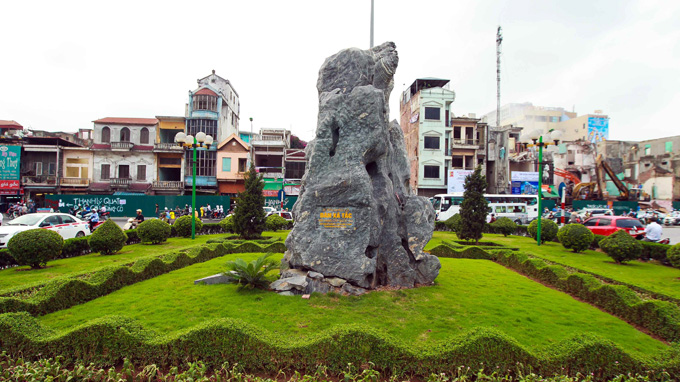Most officials and scientists taking part in the June 5 workshop which discussed the building of a flyover over the O Cho Dua intersection, a traffic chokepoint in Hanoi, objected to the two proposed options, which will see the flyover go directly above and possibly damage the historical Xa Tac relic.
The 1,571- m2- Xa Tac relic is only the exposed part of the worshipping edifice, which was built in 1048 during Ly Thai Tong’s reign to pay homage to the Land and Agriculture gods and holds a significant spiritual role in the safeguarding of the country. Professor Phan Huy Le, chair of the Vietnam History Society, though acknowledging the need for a flyover, pointed out this historical importance while explaining that options 1 and 2 may do harm to the rest of the structure.
“I strongly urge that these two options be ruled out. Approving them will certainly be a breach of the Cultural Heritage Law. I’m thus in favor of options 3 and 4, which are supposed to leave the relic unharmed,” Le stressed.
According to Tran Huu Son, CEO of Transport Engineering Design Inc., the flyover designer, under options 3 and 4, the flyover will slant southward towards Nguyen Luong Bang street to avoid the relic.
Under option 4, there will also be a one-way flyover section from Kham Thien to O Cho Dua before merging into the main section above belt road 1.
Son affirmed that these two options both meet city planning and relic preservation requirements.
At the conclusion of the workshop, the Hanoi’s People’s Committee assigned the city’s Department of Transport and the designer to work out specific plans based on options 3 and 4.
The plans will be submitted to the culture, transport and construction ministries and publicized to locals in the neighborhood for their opinions.
The flyover project has created mixed opinions among the public and met with strong objections from local historians, who argue that construction can’t occur at the cost of the relic.
“I’m glad that the ordeal has a happy ending, but there wouldn’t have been conflicts if such a workshop had been held sooner,” revered historian Duong Trung Quoc said at the workshop.
“Even if the flyover is a bit oblique, tour guides can tell their tourists that it’s a sacrifice to preserve the relic,” he noted.
The flyover, which will measure 632 m in length and 14.5 m in width with four lanes, is expected to cost roughly VND776 billion (US$37.31 million).
The Xa Tac worshiping edifice, one of the country’s key architectural items in feudal times, was lost after 1788.
After going over 200 years without being seen, part of the relic was exposed by chance in late 2006 during road maintenance in the area.






















































